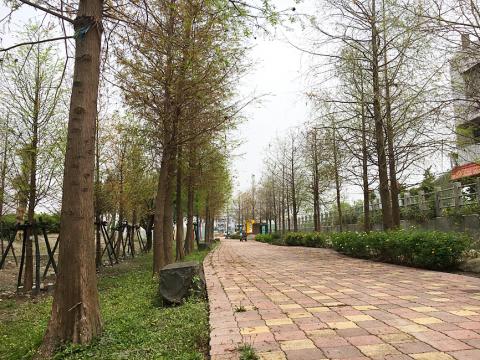Writer Wu Cheng (吳晟) on Saturday criticized the widespread planting of bald cypress trees at tourist spots and residential areas, saying the tree belongs in marshes and that its roots could damage road surfaces.
Wu said that Taiwanese believe in a “myth” about foreign trees, adding that foreign tree seeds, such as green maple, Madagascar almond, golden trumpet and cherry, often command higher prices on the local market.
Media reports on bald cypress groves and photographs showing their leaves turning yellow in fall depict the kind of imagery commonly seen in northern countries, drawing tens of thousands of tourists, Wu said.

Photo: Yan Hung-chun, Taipei Times
Some residential complexes have also capitalized on the trend and planted the trees around housing units, he said.
However, the government following suit to plant cypress gardens is “far too crazy,” Wu added.
The trend shows Taiwanese are ignorant about trees and are simply being led along by tree vendors, he said.
The trees normally grow in marshes, and while they could survive elsewhere, their roots would protrude from the ground, posing a risk to children who might trip over them, Wu said.
Another downside of cypress trees is that they shed their leaves, Wu said, adding that the needle-shaped leaves are difficult to clean up.
Wu said that if the current trend continues, green maples and other trees might be cut down for “not being the right kind of tree.”
Bald cypress trees usually grow around the Mississippi River and the Bay of Mexico, National Chung Hsing University Experimental Forest caretaker Tseng Yen-hsueh (曾彥學) said.
Tseng said that the tree’s roots and leaves do not make it appropriate for planting in cities, despite offering excellent views in winter.
Tseng said that a committee that he is on turns down requests by government agencies to plant the trees near roads or on dry land, adding that planting a few in parks is acceptable.
Wu said he has written about his experiences on tree care in his book The Poet Who Plants Trees (種樹的詩人) and encouraged people to “grow beneficial trees to care for Taiwan.”

CHANGING LANDSCAPE: Many of the part-time programs for educators were no longer needed, as many teachers obtain a graduate degree before joining the workforce, experts said Taiwanese universities this year canceled 86 programs, Ministry of Education data showed, with educators attributing the closures to the nation’s low birthrate as well as shifting trends. Fifty-three of the shuttered programs were part-time postgraduate degree programs, about 62 percent of the total, the most in the past five years, the data showed. National Taiwan Normal University (NTNU) discontinued the most part-time master’s programs, at 16: chemistry, life science, earth science, physics, fine arts, music, special education, health promotion and health education, educational psychology and counseling, education, design, Chinese as a second language, library and information sciences, mechatronics engineering, history, physical education

The Chinese military has boosted its capability to fight at a high tempo using the element of surprise and new technology, the Ministry of National Defense said in the Quadrennial Defense Review (QDR) published on Monday last week. The ministry highlighted Chinese People’s Liberation Army (PLA) developments showing significant changes in Beijing’s strategy for war on Taiwan. The PLA has made significant headway in building capabilities for all-weather, multi-domain intelligence, surveillance, operational control and a joint air-sea blockade against Taiwan’s lines of communication, it said. The PLA has also improved its capabilities in direct amphibious assault operations aimed at seizing strategically important beaches,

‘MALIGN PURPOSE’: Governments around the world conduct espionage operations, but China’s is different, as its ultimate goal is annexation, a think tank head said Taiwan is facing a growing existential threat from its own people spying for China, experts said, as the government seeks to toughen measures to stop Beijing’s infiltration efforts and deter Taiwanese turncoats. While Beijing and Taipei have been spying on each other for years, experts said that espionage posed a bigger threat to Taiwan due to the risk of a Chinese attack. Taiwan’s intelligence agency said China used “diverse channels and tactics” to infiltrate the nation’s military, government agencies and pro-China organizations. The main targets were retired and active members of the military, persuaded by money, blackmail or pro-China ideology to steal

The High Prosecutors’ Office yesterday withdrew an appeal against the acquittal of a former bank manager 22 years after his death, marking Taiwan’s first instance of prosecutors rendering posthumous justice to a wrongfully convicted defendant. Chu Ching-en (諸慶恩) — formerly a manager at the Taipei branch of BNP Paribas — was in 1999 accused by Weng Mao-chung (翁茂鍾), then-president of Chia Her Industrial Co, of forging a request for a fixed deposit of US$10 million by I-Hwa Industrial Co, a subsidiary of Chia Her, which was used as collateral. Chu was ruled not guilty in the first trial, but was found guilty